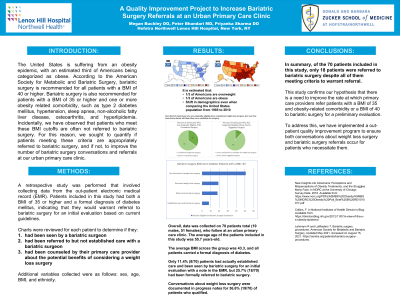Back


Poster Session A - Sunday Afternoon
Category: Obesity
A0598 - A Quality Improvement Project to Increase Bariatric Surgery Referrals at an Urban Primary Care Clinic
Sunday, October 23, 2022
5:00 PM – 7:00 PM ET
Location: Crown Ballroom

Has Audio
.jpg)
Megan C. Buckley, DO
Northwell Health, Lenox Hill Hospital
New York, NY
Presenting Author(s)
Megan C. Buckley, DO, Peter Bhandari, MD, Priyanka Sharma, DO
Northwell Health, Lenox Hill Hospital, New York, NY
Introduction: According to the American Society for Metabolic and Bariatric Surgery, bariatric surgery is recommended for all patients with a BMI of 40 or higher. Bariatric surgery is also recommended for patients with a BMI of 35 or higher and one or more obesity-related comorbidity. Incidentally, we have observed that patients who meet these BMI cutoffs are often not referred to bariatric surgery. We sought to quantify whether or not patients meeting these criteria are appropriately referred to bariatric surgery, and if not, to improve the number of bariatric surgery conversations and referrals at an urban primary care clinic.
Methods: A retrospective study was performed that involved collecting data from the out-patient electronic medical record (EMR). Patients included in this study had both a BMI of 35 or higher and a formal diagnosis of diabetes mellitus, indicating that they would warrant referral to bariatric surgery for an initial evaluation based on current guidelines. Charts were reviewed for each patient to determine if they 1) had been seen by a bariatric surgeon, 2) had been referred to but not established care with a bariatric surgeon, or 3) had been counseled by their primary care provider about the potential benefits of weight-loss surgery. Additional variables collected were as follows: sex, age, BMI, and ethnicity.
Results: Overall, data was collected on 70 patients total (19 males, 51 females) from an urban primary care clinic. The average age of the patients included was 55.7 years-old. The average BMI across the group was 43.3, and all patients carried a formal diagnosis of diabetes. Only 11.4% (8/70) of patients had actually established care and been seen by bariatric surgery for an initial evaluation, but 25.7% (18/70) had been formally referred to bariatric surgery. Conversations about weight-loss surgery were documented in progress notes for 27.1% (19/70) of patients.
Discussion: Of the 70 patients included in this study, only 18 patients were referred to bariatric surgery despite all of them meeting criteria to warrant referral. This study confirms our hypothesis that there is a need to improve the rate at which primary care providers refer patients with a BMI of 35 and obesity-related comorbidity or a BMI of 40 to bariatric surgery for a preliminary evaluation. To address this, we have implemented an out-patient quality improvement program to ensure both conversations about weight-loss surgery and bariatric surgery referrals occur for patients who necessitate them.
Disclosures:
Megan C. Buckley, DO, Peter Bhandari, MD, Priyanka Sharma, DO. A0598 - A Quality Improvement Project to Increase Bariatric Surgery Referrals at an Urban Primary Care Clinic, ACG 2022 Annual Scientific Meeting Abstracts. Charlotte, NC: American College of Gastroenterology.
Northwell Health, Lenox Hill Hospital, New York, NY
Introduction: According to the American Society for Metabolic and Bariatric Surgery, bariatric surgery is recommended for all patients with a BMI of 40 or higher. Bariatric surgery is also recommended for patients with a BMI of 35 or higher and one or more obesity-related comorbidity. Incidentally, we have observed that patients who meet these BMI cutoffs are often not referred to bariatric surgery. We sought to quantify whether or not patients meeting these criteria are appropriately referred to bariatric surgery, and if not, to improve the number of bariatric surgery conversations and referrals at an urban primary care clinic.
Methods: A retrospective study was performed that involved collecting data from the out-patient electronic medical record (EMR). Patients included in this study had both a BMI of 35 or higher and a formal diagnosis of diabetes mellitus, indicating that they would warrant referral to bariatric surgery for an initial evaluation based on current guidelines. Charts were reviewed for each patient to determine if they 1) had been seen by a bariatric surgeon, 2) had been referred to but not established care with a bariatric surgeon, or 3) had been counseled by their primary care provider about the potential benefits of weight-loss surgery. Additional variables collected were as follows: sex, age, BMI, and ethnicity.
Results: Overall, data was collected on 70 patients total (19 males, 51 females) from an urban primary care clinic. The average age of the patients included was 55.7 years-old. The average BMI across the group was 43.3, and all patients carried a formal diagnosis of diabetes. Only 11.4% (8/70) of patients had actually established care and been seen by bariatric surgery for an initial evaluation, but 25.7% (18/70) had been formally referred to bariatric surgery. Conversations about weight-loss surgery were documented in progress notes for 27.1% (19/70) of patients.
Discussion: Of the 70 patients included in this study, only 18 patients were referred to bariatric surgery despite all of them meeting criteria to warrant referral. This study confirms our hypothesis that there is a need to improve the rate at which primary care providers refer patients with a BMI of 35 and obesity-related comorbidity or a BMI of 40 to bariatric surgery for a preliminary evaluation. To address this, we have implemented an out-patient quality improvement program to ensure both conversations about weight-loss surgery and bariatric surgery referrals occur for patients who necessitate them.
Disclosures:
Megan Buckley indicated no relevant financial relationships.
Peter Bhandari indicated no relevant financial relationships.
Priyanka Sharma indicated no relevant financial relationships.
Megan C. Buckley, DO, Peter Bhandari, MD, Priyanka Sharma, DO. A0598 - A Quality Improvement Project to Increase Bariatric Surgery Referrals at an Urban Primary Care Clinic, ACG 2022 Annual Scientific Meeting Abstracts. Charlotte, NC: American College of Gastroenterology.
